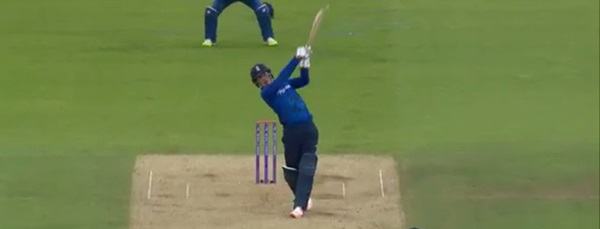We’ve just realised we quite often don’t.
Unlike some, we’re actually into Twenty20 cricket. Its formulaic nature means that a team’s strategy is easier to perceive and assess. But at the same time, unless we’re actively following a series it seems we don’t have any interest in looking at a scorecard just to see who’s done well.
Every Test scorecard will earn at least a casual glance. For T20 we’re more inclined to piece together a fragmentary picture of what’s transpired via a few headlines.
Context and meaning and all that shit
The last couple of editions of Cricket Badger have unsurprisingly contained references to Australia’s impending comedy tour of India. Because of that, we’d perhaps understandably come to think of this as being the Aussies’ next international engagement. We completely forgot that they’d deployed the shoe-horn and crammed in a T20I series against Sri Lanka.
This series is a real who-gives-a-flying-Farokh-Engineer of an engagement. The two teams aren’t taking each other on in any other formats, there’s no ICC World T20 this year and Australia have a Test match scheduled on another continent within 24 hours of the third match finishing.
In short, it’s the kind of thing the ICC are going to try and sort out with their bid to impose some sort of coherence on international tours.
But even so…
We still don’t think we’d much care unless we’d properly followed the rest of the tour. Even then, if the T20s were at the end, we probably wouldn’t give a toss either. We’re fairly sure of this because we also haven’t clicked through to the South Africa v Sri Lanka scorecard as the bigger stuff’s already done and dusted.
So basically we like the World T20. There’s enough going on then that even losing performances seem pertinent and you also know that teams have tried to peak and are taking it seriously.
The ‘do you even click on the scorecard?’ test is an interesting one to gauge what does and doesn’t matter to you.




Not sure I understand why the Aussie tour of India is a comedy tour. Perhaps I’ve missed the joke. Wouldn’t be the first time, nor the last, I fancy.
Meanwhile, top cricketer spotted action in Cricket Badger this week, courtesy of a KC regular, AP Webster. I won’t spoil it for others by revealing vital elements of the content. Suffice it to say that I, as someone who has himself been in the Arndale Centre (well, through it more than in it, truth to be told), do not find it so surprising that Jimmy Anderson might have been spotted in there.
You haven’t missed the joke yet. The comedy should begin on either day one or day three of the first Test, depending on whether Australia get to bat first or not.
Can’t believe you’ve used AP Webster’s ‘Cricketer Spotted’ story over mine. I AM LIKE, LITERALLY, LIKE GUTTED!
Not over, just ahead of. His email must have landed first.
Sometimes. If I’m that bored at work and/or have an interest in the teams involved, or the scores/result look ‘tasty’ – a couple of ‘meh’ scores like 157-6 won’t sufficiently pique my interest like, say, 230-2 or 68ao would.
I just clicked through to see that CdBM did as many super sixers as worthless wickets today…
A good summary of my own crick-through incentives.
Another point: T20Is are often in very close temporal proximity, even more so than ODIs seem to be. So I sometimes get confused about whether a T20I scorecard link refers to a previous, ongoing or upcoming game, and some slip through the net thataway. Particularly if the team totals look similarish from one game to the next, I may not recognise the second game as a new game at all.
Another point, literally – why no dot above the first ‘i’ in ‘sufficiently’? What does this place think it it is tinkering with fonts? Facebook? The caretaker of a Christian denomination church?
Any batsman can get a good ball in a test match, and so a one-off low score is not necessarily representative of performance. But that aside, test scores for individual batsmen tell you if they are playing well or badly, and how important they are to the team. The scorecard therefore contains the story of the match, a single-page highlights show. Who here hasn’t imagined the match from simply reading the batsmen, bowlers and FoW on a scorecard?
This just isn’t true in T20. Because the first five wickets don’t matter, every batsman is effectively in the Graeme Swann role – slog till you’re out. That might be second ball for 6, or twentieth ball for 38, or fiftieth ball for 127. There is nothing in those numbers that tells you anything about the player, about how well or badly they are doing, because their entire job is to be on the ragged edge of risk. A first-ball duck is not necessarily a failure in T20 – it is certainly better than a ten-over 25.
Series averages and scoring rates are probably the smallest set of statistics that approach telling an accurate T20 story.
Almost a case for producing a different style of scorecard for T20 – an over-by-over kind of thing maybe.
Quite often the story is not that Alan McBowlerod conceded 38 from four overs, but that he conceded 12 from three and then 26 off his fourth when the chasing side looked destined to fail.
This would similarly give a clearer breakdown of the innings played by Bojangles O’Batsmanpants.
In short, the story of a T20 match is not just ‘how many’ and ‘how quickly’. It’s also about when the runs were scored and when the wickets were taken.
I think Peter Bowler and Gareth Batty McGarethBattyface are the names you’re looking for, Bert. A Bowler who bats and a Bat(ty) who Bowls. The bowler would then bowl to Bowler, but never vice versa.
Indeed. And given that the purpose of statistics is to simplify a complex situation, maybe a T20 match is sufficiently simple to start with to avoid needing them. The raw data would do – something like this, for example:
AAAAAA / ABBBBB / BBCCCC / CCCCCA / CCCCCC
. . 2 2 . 4 / 1 4 4 . . 1 / . W . 2 . 1 / 6 . 4 2 1 . / 6 6 4 2 4 3
So it shows batsman A doing OK, batsman B struggling a bit, batsman C in the groove, and the bowling can be just as easily interpreted (why did he bring Mitchell Johnson on after only two overs from Starc?)
Getting it to line up would be handy as well.
Getting them to line up would be handy as well.
Who said that?
You did, Bert. I would never confuse you with Bert, or anybody else on KC, for that matter.
How could batsman A face the first ball of the second over after hitting the last ball of the first over for four.
I clicked through to the NZ/SA scorecard, since that’s the first match of a potentially interesting tour. I didn’t click on the Aus/SL one. However, had I been awake when that match was going on, I’d have been more than happy to watch it, despite its meaninglessness. Having been asleep, though, I could hardly care less.
One thing I might like to see, rather than representative teams in T20 internationals, is teams from each country’s domestic T20 tournament playing each other. Kent recently played in a West Indies domestic competition and for whatever reason I found myself more inclined to check the scorecards of those games than even these Aus/SL ones.
Wasn’t that done before? And became a bit of a farce because every team’s best players bailed out to join the IPL team they were in?
The Champions League became a farce because there were too many IPL teams involved and the format was set up basically to ensure the IPL teams did well. But even then it had its strengths, mainly that viewers got to see lots of players they wouldn’t otherwise. It could have been a showcase for the domestic game, but instead it was a mini-IPL. I’d like to see something that carried forward the strengths of the Champions League without functioning as a pure cash grab for the owners of IPL teams.
Just not really bothered about this pyjama cricket. Wake me up when the Tests resume.
Agreed. I’ll set the alarm.
I don’t even click through to articles about T20 until days after they’re posted.